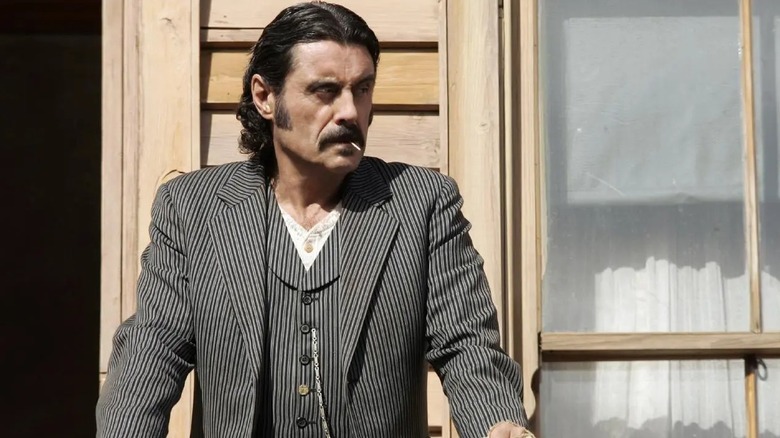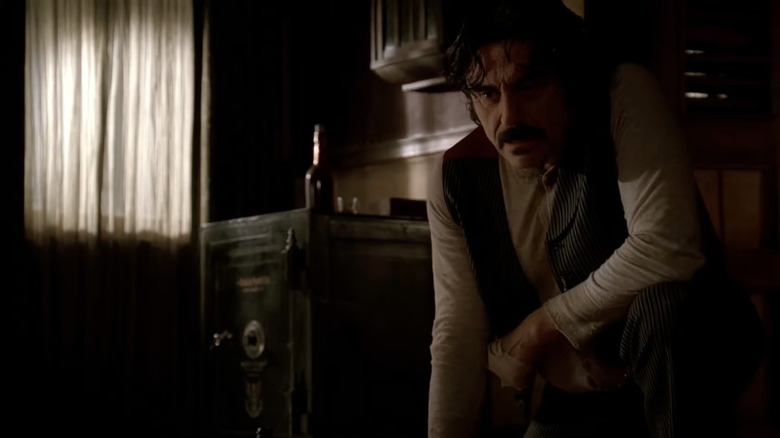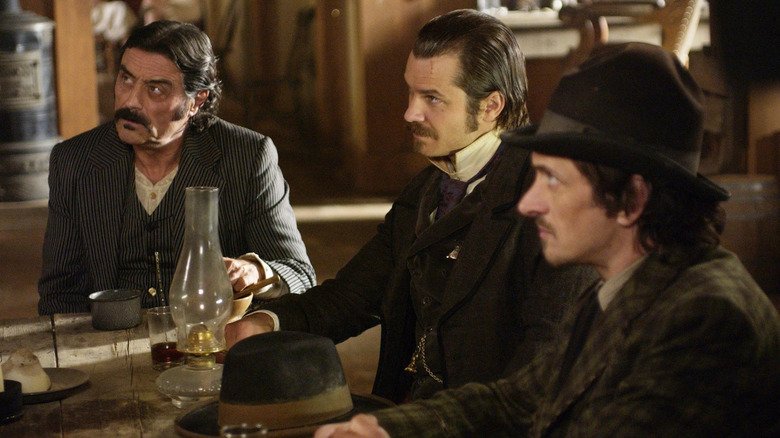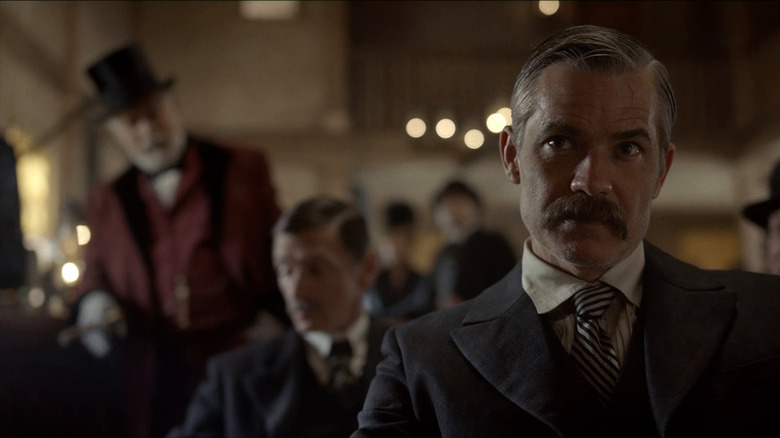Deadwood Creator David Milch Says It's A Waste Of Time To Feel 'Betrayed' By The Show's Cancellation
Here's a challenge. Read a random "TV shows canceled too soon" listicle floating around the internet. A series that will be on every single one (at least any that was written with a little bit of taste) is "Deadwood," HBO's gone-too-soon western.
The series ran a respectable three seasons (36 episodes) on HBO from 2004 to 2006, but ended inconclusively. The cast and crew also had more to tell. While everyone eventually got the chance to conclude the story with a two-hour wrap-up movie in 2019, "Deadwood: The Movie" was an epilogue, not a full new season of material.
Set in the eponymous South Dakota town during the 1870s, "Deadwood" was Shakespearean — literally, for most of the dialogue was written in iambic pentameter (and bounced from tragedy to farce just like the Bard's work did). The show was fairly faithful (but not bound) to history, with real men as the two leads: lawman Seth Bullock (Timothy Olyphant) and saloon owner/pimp Al Swearengen (Ian McShane). As we've argued before, the show was filled with great moments. That's why the never-made season 4 stings.
One person who didn't let the series' cancellation get him down, though? Its creator, David Milch. In his memoir, "Life's Work," Milch shared the outlook that helped him stave off feelings of betrayal when the show ended its run early.
Something pretty
In chapter six of "Life's Work," Milch remembers the cancellation of "Deadwood" and how editing season 3's episodes was bittersweet, since he already knew this was the end. Why "didn't [he] set fire to anything" over it? He decided that endings aren't everything:
"Probably the biggest lie is the idea that we are entitled to a meaningful and coherent summarizing, a conclusion of something that never concludes."
In the season 3 finale of "Deadwood," "Tell Him Something Pretty," the good guys lose, plain and simple. Rapacious robber baron George Hearst (Gerald McRaney) buys the mine of Alma Garrett (Molly Parker) after having her kindhearted husband Whitney Ellsworth (Jim Beaver) assassinated. Hearst successfully rigs the sheriff's election against Bullock. Trixie (Paula Malcolmson) fails to kill Hearst and Al has to kill the similar looking Jen (Jennifer Lutheran) to save her. The series ends with Al scrubbing up Jen's blood, muttering that her lover Johnny (Sean Bridgers), "wants me to tell him something pretty." The fans wanted the same from Milch, who continues:
"To waste time regretting or feeling betrayed as if there was some contract with the audience that was defaulted on, was to deprive oneself, as a member of the audience and participant in the making, of the pleasure of appreciating what did exist."
This is a very glass-half-full way of looking at TV cancellations, and one that's applicable to many more than "Deadwood." While Olyphant felt the movie was too little, too late, McShane has come around to a view similar to Milch's:
"We had those three years, [I] worked with some wonderful actors, incredible experience doing the show... it was like doing theater workshop with television, movie' improvisation... [David] was the best showrunner I ever worked for."
Why was Deadwood canceled?
"Deadwood" received positive buzz throughout its run. While the ratings declined after season 1, they weren't poor enough that HBO wanted the series to end. So why did it? We've explored this question before, now let's look at explanations from people closer to the series.
In 2019, McShane described the series' cancellation as a "total shock" and felt it stemmed from a "p****** contest between the executives and David, and David ain't gonna back down from anything."
McShane's guess is backed up by reporting from Matt Zoller Seitz, TV critic and "Deadwood" expert. Seitz is the primary author of "The Deadwood Bible: A Lie Agreed Upon" (the subtitle comes from the season 2 premiere). The book is half oral history of the "Deadwood" production, half critical analysis of the series (plus Milch's later projects). Seitz published his findings on the show's cancellation in his book and excerpted them at Vulture.
According to Dayton Callie (who played Charlie Utter), he was in the room during the phone call that killed "Deadwood." On May 5, 2006, Milch received a call from Chris Albrecht, then chairman/CEO of HBO. Albrecht was offering Milch a shortened season 4, either six or eight episodes (depending on whose account). Milch's answer? "Okay, f*** it — why don't we do none." Things escalated from there.
The show canceled itself
According to Albrecht, he intended that phone call as the beginning of a negotiation. Milch's defiant reaction meant it was instead the beginning of the end. According to Seitz, Milch felt both obligated to do 12 episodes and to let his people know the show was "having problems" so they could make back-up plans. The rumors of cancellation swirled from there and the anti-"Deadwood" factions in HBO took advantage of them to kill the show. Albrecht commented:
"By the time the weekend was over, the trades had it that we were cancelling 'Deadwood,' because I'm sure what happened with Tim is he called his agent and said 'Holy f***, they're cancelling 'Deadwood!' David should have just shut up and calmed down over the weekend. We would have talked about it on Monday, and we would have come to a solution that would have resulted in a season 4 and an ending to the story, or the series, okay? But he did what he did, and it got out of our hands. We never canceled the show. The show canceled itself."
It's tempting to say Milch dug his own grave, but "Deadwood" executive producer Gregg Fienberg disagrees:
"Do you think if David Chase had ended a conversation about doing a sixth season of 'The Sopranos' on a Friday by going, 'F**k it, how about none,' that they wouldn't have called him back immediately and said, 'Wait a second, let's talk about this and see if we can work something out'? Let's not let HBO off the hook here."
Herein lies the danger of art; it's controlled entirely by human ego. Milch's advice, to cherish what you get, rings true. It's only because "Deadwood" fans did cherish those 36 episodes that they got the ending they wanted in the first place.



